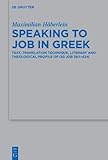Speaking to Job in Greek : Text, Translation Technique, Literary and Theological Profile of OG Job 38:1-42:6 / Maximilian Häberlein.
Material type: TextSeries: Beihefte zur Zeitschrift für die alttestamentliche Wissenschaft ; 560Publisher: Berlin ; Boston : De Gruyter, [2024]Copyright date: 2024Description: 1 online resource (IX, 442 p.)Content type:
TextSeries: Beihefte zur Zeitschrift für die alttestamentliche Wissenschaft ; 560Publisher: Berlin ; Boston : De Gruyter, [2024]Copyright date: 2024Description: 1 online resource (IX, 442 p.)Content type: - 9783111397443
- 9783111399140
- 9783111399003
- online - DeGruyter
- Issued also in print.
| Item type | Current library | Call number | URL | Status | Notes | Barcode | |
|---|---|---|---|---|---|---|---|
 eBook
eBook
|
Biblioteca "Angelicum" Pont. Univ. S.Tommaso d'Aquino Nuvola online | online - DeGruyter (Browse shelf(Opens below)) | Online access | Not for loan (Accesso limitato) | Accesso per gli utenti autorizzati / Access for authorized users | (dgr)9783111399003 |
Dissertation Universität Würzburg 2023.
Frontmatter -- Acknowledgments -- Contents -- 1 Introduction -- 2 Reading OG Job: Reflections on Method -- 3 Reconstructing the Old Greek -- 4 Translation Technique and Literary Analysis of OG Job 38:1–42:6 -- 5 Conclusions -- 6 List of Abbreviations -- 7 Bibliography -- 8 Index of Ancient Sources
restricted access online access with authorization star
http://purl.org/coar/access_right/c_16ec
This study investigates the Old Greek translation of Job regarding its text, Vorlage, translation technique, literary contexts, and theological profile.To situate OG Job within its ancient contexts, both the strategies employed by the translators and the literary profile of the translated text have to be taken into account. Thus, an approach is employed encompassing a thick description of translational strategies; and a reading of the translated text in its own right. This framework is applied in an investigation of God’s answer to Job in OG Job 38:1-42:6. The results show that the translators worked from a Vorlage similar to, but not fully identical with MT, and produced a coherent, stylized text. The transformations undertaken, including double translations, intertextual renderings, minuses, small-scale rewritings and paraphrases, can be situated in an environment influenced by Greek educational and philological practices, but are also deeply indebted to Jewish scribal traditions. While not introducing sweeping theological changes, the translation nevertheless shows a tendency to emphasize divine sovereignty. The study thus contributes to a deeper understanding of this important witness to the book of Job an Jewish literature in the Hellenistic period.
Issued also in print.
Mode of access: Internet via World Wide Web.
In English.
Description based on online resource; title from PDF title page (publisher's Web site, viewed 20. Nov 2024)


